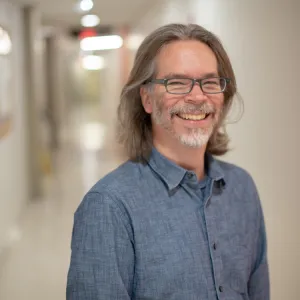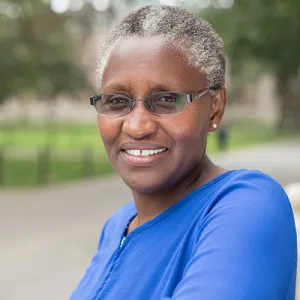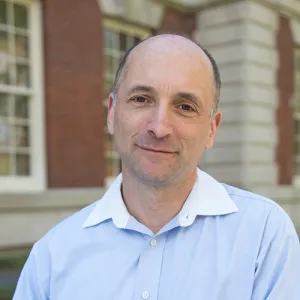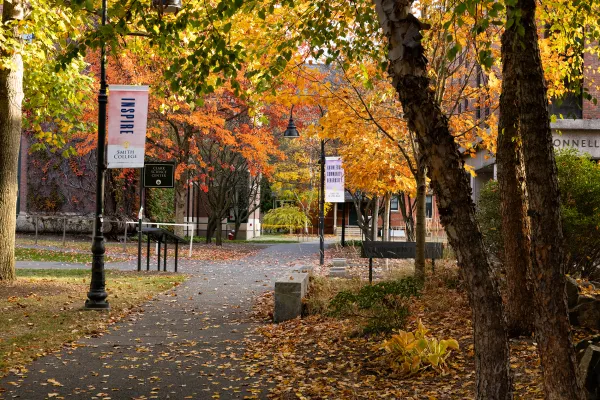Sharing the Joy of Teaching at Smith
Research & Inquiry
The recipients of this year’s Sherrerd Teaching Awards describe what they value most about their work as teachers and scholars
Photo by Jessica Scranton
Published October 23, 2025
While the three Smith College faculty members selected for this year’s Sherrerd Teaching Awards followed different paths to becoming educators, they share a commitment to creating inclusive classrooms where students are partners in the learning process.
They also approach their subject areas in engaging ways. From addressing the biases that underlie scientific progress and education theory, to helping students explore the roots of their own political loyalties, the work of the award recipients exemplifies what one nominator called “transformative teaching” at Smith.
The 2025 recipients of the Kathleen Compton Sherrerd ’54 and John J. F. Sherrerd Prize for Distinguished Teaching are:
- Nate Derr, associate professor of biological sciences
- Howard Gold, professor of government
- Lucy Mule, professor of education and child study
The annual award was created to recognize exceptional teaching by long-time Smith faculty members, as well as encourage newer faculty who have demonstrated outstanding skill in teaching and mentoring.
The college community is invited to celebrate this year’s honorees at a ceremony on Thursday, October 30 at 4:30 p.m. in the Campus Center Carroll Room. Student and faculty nominators will introduce the award recipients, and a reception will follow in the atrium.
We asked this year’s prize recipients to share some thoughts about what they value about teaching at Smith, and what they have learned from their students. Here’s what they had to say.

What inspired you to become an educator?
Nate Derr: “Even though I’m a biochemist now, I didn’t take a single biology or chemistry class in college. Instead, I was a physics major and one class shy of a double major in fine art. I realized at some point I wanted to be a professor, and I later chose a liberal arts college because I didn’t want to just manage a lab as a principal investigator. I also wanted to be at the bench and I wanted to be doing that research with undergraduates. At Smith, I’m excited to teach introductory courses where I get to show students, for the first time, how amazing biological systems are.”
Howard Gold: “I have to confess that becoming an educator was not my original career plan. I attended graduate school in political science because I wanted to study political behavior. I thought I would eventually return to [his country of origin] Canada, perhaps working in polling. But I never made it past Northampton. I interviewed at Smith and was quickly taken with the place. I was teaching a class on American elections right in the middle of the 1988 presidential election campaign. I loved coming to class, discussing connections between course material and the ongoing campaign, and challenging—and being challenged by—my students. I quickly came to the realization that this was the right environment and career for me.”
Lucy Mule: “By the time I completed high school in Kenya, I knew I wanted to be a teacher. Back then, teachers enjoyed a good amount of prestige. Most of the teachers I had in primary and secondary schools made a positive impact on me. I admired their lifestyles, how well-spoken they were, and the respect they commanded in the community. I decided to join a teaching university after high school, and I would later pursue graduate studies, during which time I taught college students. I’ve been teaching college students since then and enjoy the work immensely.”

Professor Mule, as a scholar of education and child study, what do you tell your students about how to become effective teachers?
LM: “I like talking about education workers, be they classroom teachers, administrators, support staff, researchers, policy makers. The field is broad and I want my Smith students to know about the vibrancy of education as a whole. I consider it my responsibility to guide them in their journeys in the best ways possible. For those who want to become classroom teachers, I emphasize that teaching is both a craft and a science and it requires clarity of purpose, adequate practice, and commitment to being a lifelong learner. I also impress on them the need to hone their agency for transforming lives and communities through education work.”
Professor Derr, what are you teaching your students about how to be good scientists?
ND: “Many things! One is that science is more than molecules and cells; it’s a human endeavor, inextricably linked to human culture and how humans do things—socially, politically, culturally. To be good scientists we have to think about, not just the research we do, but the impact of our research and the mechanisms through which that research is accomplished. I take time to talk about our current Golden Age of Biology, and how both science and our world need these students to become scientists. I teach them that they belong in science. The scientific world needs graduates of liberal arts colleges—and Smith students in particular—to become prominent scientists and leaders.”
Professor Gold, what do you tell your students about the importance of studying government?
HG: “I try to convince students that understanding the dynamics of American politics will be highly relevant to their lives, and that it will help them as consumers of information to become more critical thinkers. When I teach classes on contemporary public opinion, the mass media and elections, it’s not hard to explain to a class of highly engaged Smith College students how and why this material is relevant to their lives.”

What is a lesson you’ve learned from your students?
HG: “I am continually impressed by my students’ level of engagement, the seriousness with which they take their studies, their ability to handle multiple commitments, and the solidarity and compassion that they regularly display. I have led class discussions on difficult topics that have engendered sadness and apprehension. Yet, even in the context of these difficult classroom moments, I have come away with an even deeper respect for my students, who still manage to demonstrate so much poise and empathy.”
LM: “Smith students have taught me to fully appreciate the passion and curiosity that young people bring to learning spaces. Teaching and learning are most exciting when I invite them to become partners in the classroom. I’ve learned that they appreciate when I model ways to learn with courage and without losing hope, while traversing borders based on race, ethnicity, age, language, ideology, nationality, etc. I have also learned that students are most engaged when they bring their full selves into learning spaces. I strive to hold them to high standards, while appreciating the fact that they have different learning styles, come from different socio-economic and cultural backgrounds and experiences, and possess different levels of self-confidence.”
ND: “I’m learning from my students all the time. I see them as collaborators in the classroom and in my research lab. At the beginning of my time at Smith, I operated more as a transmitter of knowledge. Now, I give my students opportunities to construct knowledge for themselves, both as individuals and through interactions with other students. Smithies excel at ‘mentoring up’—they are not afraid to tell me what they need and when I’ve made mistakes. They have been an essential part of my growth as an educator.”
